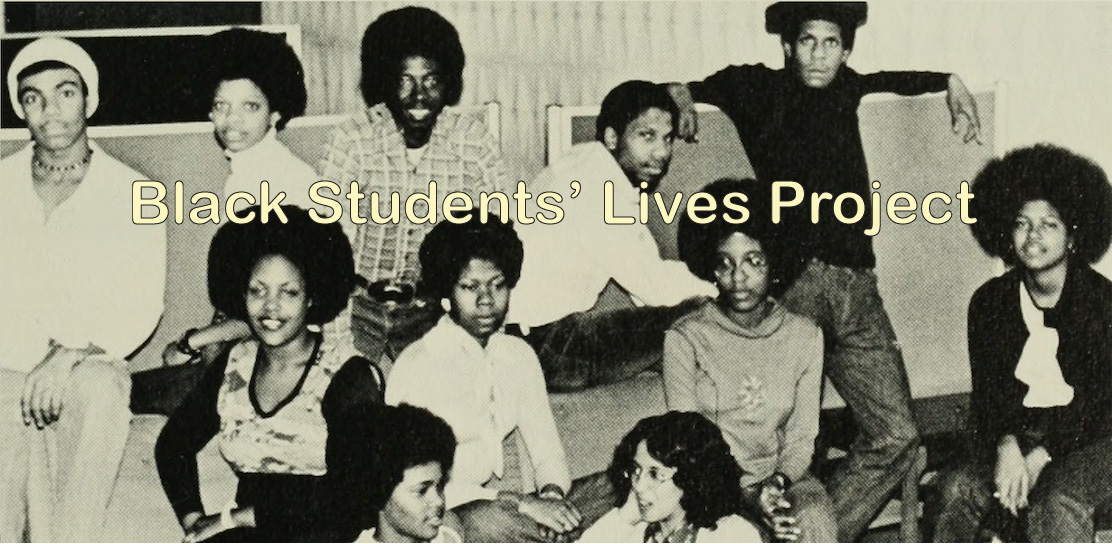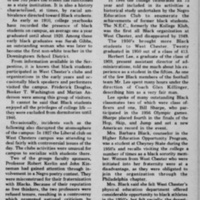Experiences of Blacks at West Chester State
Title
Experiences of Blacks at West Chester State
Subject
article on black students lives
Description
Article discusses the history of black students on West Chester's campus, focusing on the first black student and the racism and discrimination non-white students experienced on campus.
Creator
Claudia Rohfls
Source
Quad Angles
Publisher
West Chester University
Date
February 17, 1975
Contributor
Jacquelynne Conyers-Jordan
Rights
Digital images in Library Services’ Digital Collections are issued by Special Collections, Francis Harvey Green Library, West Chester University. Images are provided for non-commercial, educational, and personal use only, and are not intended for reproduction or redistribution. For the above purposes the user may reproduce these materials (by download, printing, etc.) without further permission, on the condition that proper attribution of the source for all copies is provided by clearly acknowledging the name of the Library, the title of the web page or resource and the URL at which it was located, please credit as follows: Special Collections, Francis Harvey Green Library, West Chester University, West Chester, Pennsylvania. For questions regarding use of digital materials contact Special Collections (libspeccol@wcupa.edu or 610-436-3456).
Identifier
https://digital.klnpa.org/digital/collection/wcnp01/id/15318
Text
Experiences of Blacks at West Chester State By CLAUDIA ROHLFS The history of the black student at West Chester is a long one, covering most of the 103 years the school has functioned as a state institution. It is also a history characterized, at times, by racial ambivalence directed toward Black students. As early as 1910, college yearbooks have recorded the presence of black students on campus, an average one a year graduated until about 1920. Among these early black graduates was Sarah Gibbs, an outstanding woman who was later to become the first non-white teacher in the Downingtown School District. From information available in the Serpentine, it is known that black students participated in West Chester's clubs and organizations in the early years and occasionally black speakers and performers visited the campus. Frederick Douglas, Booker T. Washington and Marian Anderson were among this group of visitors. It cannot be said that Black students enjoyed all the privileges of college life — they were excluded from dormitories until 1946. Occasionally, incidents such as the following also disrupted the atomosphere of the campus: In 1927 the Liberal club on West Chesters campus was attending to deal fairly with controversial issues of the day. The clubs activities were unusual for campus to socialize with students there. Two of the groups faculty sponsors, Professor Robert Kerlin and John Kinneman had gained attention through involvement in a Negro poetry contest. They were misconstrued for their fraternization with Blacks. Because of their reputation as free thinkers, the two professors were refused tenure, resulting in a controversy which prompted national criticism by such magazines "the Nation" and such educators as John Dewey, a famous educational philosopher. During the 1930'5, there was an increase in Black enrollment and about five blacks students graduated per year. At this time also Dean Winfield Menhennet gained notoriety through his refusal to accept a transfer request from a black student. In the subsequent investigation, it was found that non-white students on campus were without dorm facilities and were refused swimming privileges at the YMCA. Black student teachers were denied access to junior and senior high schools. In 1946 the college celebrated its 75 year and included in its activities a historical study undertaken by the Negro Education Club to enumerate the achievements of former black students. The N.E.C., formerly the Kollege Klub, was the first all Black organization at West Chester, and disappeared by 1949. The 1950's brought more Black students to West Chester. Twenty graduated in 1950 out of a class of 413. Herbert Lee, a graduate of the class of 1959, present assistant director of administrations, told me much about his experience as a student in the fifties. As one of the few Black members of the football team Mr. Lee spent many hours under the direction of Coach Glen Killinger, describing him as a very fair man. Lee spoke of many outstanding Black classmates two of which were class officers and one, Bill Sharpe, who participated in the 1956 Olympic games. Sharpe placed fourth in the finals of the Hop, Skip, and Jump and set a new American record in the event. Mrs. Barbara Black, counselor in the Higher Education Opportunity Program, was a student at Cheyney State during the 1950's and recalls visiting the college a number of times as a black sorority member. Women from West Chester who were initiated into her fraternity were at a disadvantage, as they were obligated to join the organization through the Philadelphia chapter. Mrs. Black said she felt West Chester's physical education department offered considerable opportunity to black athletes in the 1950'5, but felt racially, the department lags behind the times today. The last major barrier for blacks was destroyed in 1961. In that year, the first black faculty member in the Pennsylvania State College System began teaching at West Chester as head of the student teaching program. Ruby Jones, formerly a student, entered West Chester as a faculty member at a significant time. She and others were to witness a growing black consciousness which was to influence black life at West Chester in the 1960's and 1970'5.
Files
Reference
Claudia Rohfls 1975, Experiences of Blacks at West Chester State, West Chester University


